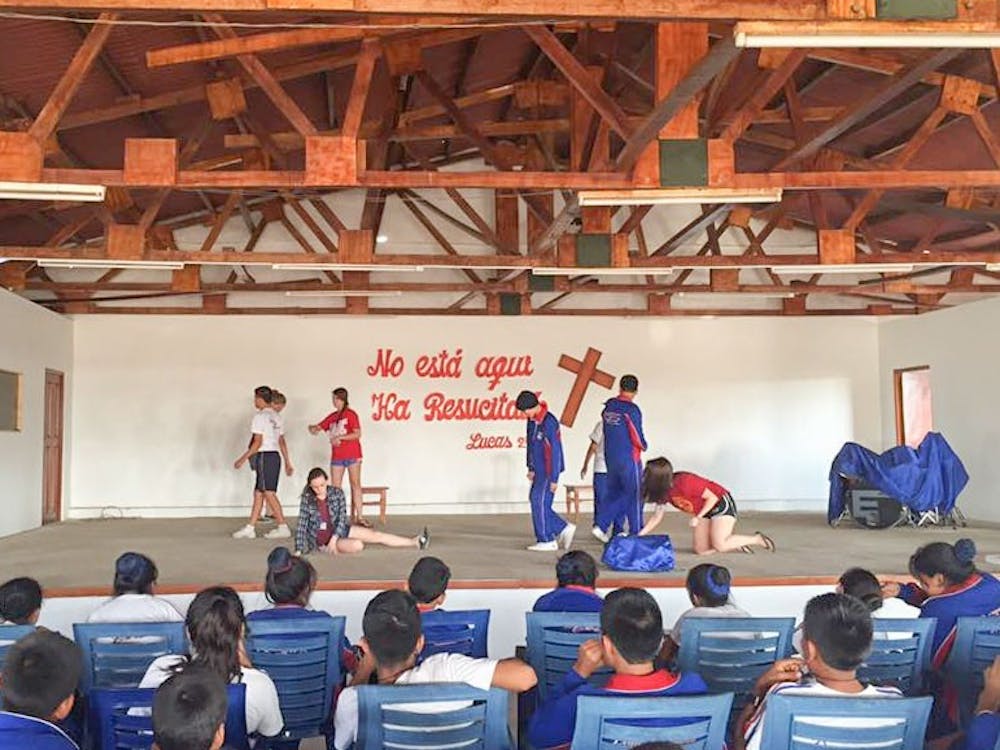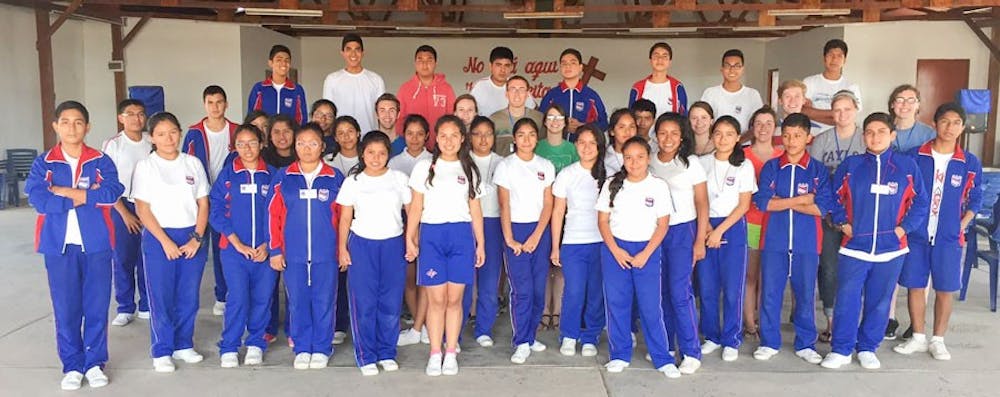
By Hope Bolinger | Echo
"If you're trying, (the students) will try back."
This statement from senior Megan McKechnie encapsulates the experience theatre students had in Reque, Peru. In 10 brief summer days, team members dealt with language barriers and the high school students' suppressed emotions. Yet, through theatre exercises in an after-school program, walls in the hearts of high school students crumbled.
Taylor students arrived at Roma Lee Courvisier School on May 23, 2016 and plunged into activities. They awoke at 5 a.m. in their "humble missionary house," junior Alexis Turner said. During the school day, they completed construction and painting projects at Roma. However, the clichés of a typical short-term mission trip ended there.
After a two-hour planning session, Roma students filed into a room at the school, and theatrical activities commenced. The leader of the trip, Technical Director of Theater Terrance Volden, explained the typical after-school meetings.
During the first day, even though the Roma members resisted participating fully in the improv games, Volden eased timid students into warm-up activities.
He attributed their shyness to the Peruvian culture. "(Students) talk a lot, but not about deep things. So a lot of people feel like they don't have an opportunity to really connect with others."
McKechnie also hypothesized that the high schoolers did not want to set themselves apart or be singled out due to cultural constraints.
Each day followed roughly the same structure. After the kids arrived, they began warming up. Warm-ups morphed into improvisational exercises and scene work. Volden found his original inspiration for the trip from the book "Theatre for Community Conflict & Dialogue" by Michael Rohd. Students created scenes involving conflict and opened a dialogue about how to resolve struggles they faced.
McKechnie remembered one improv activity, Activating Scenes, which evoked difficult, yet profitable, discussions:
"(Through these activities), we tried to talk to the kids about the message of respect, especially between genders. That was a big issue there."
According to Volden, the two largest conflicts they addressed were loneliness and machismo, the need for men to act aggressively to prove their manhood. Both issues emerged from gender expectations of Peruvian culture. Men generally adopt a stoic outlook when dealing with emotions. Women, subjected to catcalls and degrading stereotypes on a daily basis, often feel inferior, according to Volden.
Although Roma students approached discussing these societal subjects with reserve, by the third day, they embraced the activities and the conversation.
Turner confirmed this and said, "In seeing how goofy we could be with them, they warmed up to us fairly fast and paid close attention to the exercises we had them do."
Overjoyed by the unexpected, open responses from the kids, McKechnie suggested the silent nature of the activities dissolved unease caused by language barriers. The participants could communicate deep-seated troubles nonverbally. Because of the heavy subject matter, the theatrical exercises helped to express struggles words could not convey.
Even though the mission team did not focus on biblical passages during these tasks with the kids, McKechnie said these activities helped Taylor students see the world through a Peruvian high school student's eyes. This understanding fostered an atmosphere where the Gospel could enter.
Turner agreed that though they did not focus on a particular verse, the theme of hope weaved itself throughout the week:
"Your strength is in who you are, so finding this idea in the exercises we did was a gateway to possibly finding that hope."
Even though the students at Roma learned about conflict resolution through the exercises, the team reflected on how the Peruvian kids taught them as well about handling gender conflict. McKechnie remembers a group which had only one girl. The boys could have ostracized the one female in their age bracket. Yet, instead, they embraced, included and treated her with kindness.
While the Peruvian students dealt with conflicts, the mission team experienced struggles along the way as well.
Volden grappled with the possibility the mission could not have any effect on the kids they went to serve. Because Taylor students had never attempted a theater-centered ministry in Peru, Volden had no idea if the kids at Roma would engage deeply with the material.
McKechnie feared the tension of language obstacles, and Turner wrested with stepping outside of her comfort zone when trying an octopus dish. Yet, despite fear and unease, the team reaped success with Roma students and with themselves.
Turner said, "I was glad for the discomfort. That's how I knew God was nudging me to take a plunge into the great unknown. I'm glad I did."





